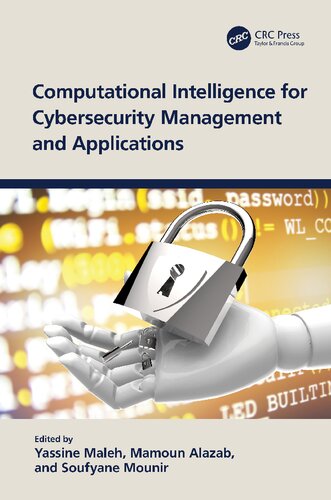

Most ebook files are in PDF format, so you can easily read them using various software such as Foxit Reader or directly on the Google Chrome browser.
Some ebook files are released by publishers in other formats such as .awz, .mobi, .epub, .fb2, etc. You may need to install specific software to read these formats on mobile/PC, such as Calibre.
Please read the tutorial at this link: https://ebookbell.com/faq
We offer FREE conversion to the popular formats you request; however, this may take some time. Therefore, right after payment, please email us, and we will try to provide the service as quickly as possible.
For some exceptional file formats or broken links (if any), please refrain from opening any disputes. Instead, email us first, and we will try to assist within a maximum of 6 hours.
EbookBell Team

4.0
6 reviewsAs cyberattacks continue to grow in complexity and number,
Computational Intelligence is helping under-resourced security analysts
stay one step ahead of threats. Drawing on threat intelligence from
millions of studies, blogs, and news articles, Computational
Intelligence techniques such as Machine Learning and automatic natural
language processing (NLP) quickly provide the means to identify real
threats and dramatically reduce response times.
Computational
Intelligence for Cybersecurity Management and Applications collects and
reports on recent high-quality research addressing different
cybersecurity challenges. It:
Explore the newest developments in the use of computational intelligence and AI for cybersecurity applications;
Provide
several case studies related to computational intelligence techniques
for cybersecurity in a wide range of applications (Smart Healthcare,
Blockchain, Cyber-Physical System, etc.);
Integrate theoretical
and practical aspects of computational intelligence for cybersecurity so
that any reader, from novice to expert, may understand the book's
explanations of key topics.
The book offers comprehensive coverage of the essential topics, including:
Machine Learning and Deep Learning for cybersecurity
Blockchain for cybersecurity and privacy
Security engineering for Cyber-physical systems
AI and Data Analytics techniques for cybersecurity in smart systems
Trust in digital systems
Computational
Intelligence for Cybersecurity Management and Applications comprises
many state-of-the-art contributions from scientists and practitioners
working in cybersecurity. The book’s goal is to serve as a reliable
resource for students, researchers, engineers, and professionals in the
field, as well as anyone interested in learning about the many
dimensions of cybersecurity and the cutting-edge developments in
artificial intelligence for cyber threat management. This book contains
11 chapters divided into three sections.